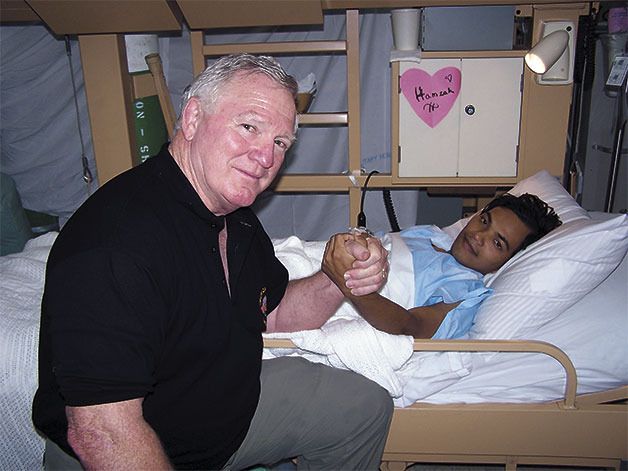When Bill McDaniel was writing his book, “Faces of the Tsunami,” it wasn’t easy.
But on Jan. 22, he’ll be sharing his stories with anyone interested during a book discussion in the Oak Harbor Library.
McDaniel, an orthopedic surgeon and retired rear admiral of the Navy, was asked to join relief efforts after a tsunami hit Indonesian shores Dec. 26, 2004.
There for more than three months, McDaniel helped coordinate efforts by Navy personnel and Project HOPE volunteers aboard the USNS Mercy to bring emergency health care to the area.
“It was such an intense, meaningful thing,” McDaniel said. “You were awake 20 hours a day dealing with these people, and even when you weren’t working, you were sitting there talking with them.”
Even now, 10 years later, the stories are fresh in McDaniel’s mind as he recalls patients he met. The story McDaniel used to open his book is a particular standout to him.
It happened after an 8.6 magnitude earthquake hit Nias Island off the Indonesia coast March 28, 2005. While McDaniel was working to move patients back and forth from the ship, he was asked to bring a 13-month-old baby with pneumonia to the ship.
The baby, along with his worried father, were the only two in the family left alive after the earthquake, and McDaniel took on the responsibility of keeping the baby alive.
Since the child was already very sick, McDaniel took the pair to a nearby soccer field where the helicopters landed to ferry patients. He requested an emergency helicopter immediately and joined the father to wait for its arrival.
“Meanwhile, I’m watching with alarm as this kid gets sicker and sicker,” McDaniel said. “I’m an orthopedic surgeon. Sick kids scare me just as much as they scare anybody, and this kid was turning blue.”
For more than an hour, McDaniel and the father tended to the child, bathing him with a cool towel and stimulating him as much as possible to keep him breathing.
Eventually, McDaniel took the radio from the communications personnel, who had previously assured him a helicopter was coming, and yelled to those aboard the ship, demanding to know where it was.
A miscommunication, McDaniel found out, had led those aboard the ship to believe he simply wanted a routine helicopter, which would come later in the day.
Half an hour later, McDaniel, the father and the sick baby were on their way back to USNS Mercy. The baby lived.
“That was probably the single most, for me, traumatic day that I spent,” McDaniel said.
Though it was a difficult book for him to write, McDaniel said that the experiences over there should be shared.
“It’s a story that people should hear,” he said. “I just think that story is worth telling and telling repeatedly.”
He’s given a talk on the subject matter more than 150 times, he said, to audiences ranging from two to 6,000 people.
“People respond to what we did. People respond very nicely,” McDaniel said. “This country, it does amazing work.”
McDaniel said that the efforts in Indonesia were “probably the high point of our relations with a Muslim country.”
“We’re highly thought of there, still are today,” he said.
During the book discussion, McDaniel said he will share pictures of the people he met over there, along with their stories.
He said the book, and the talk he plans to give, could appeal to anybody and that it’s important to recognize the fact that the country sends response teams, both military and volunteer, to every natural disaster that happens around the world.
The experience in Indonesia changed everybody involved, according to McDaniel.
The USNS Mercy took along a team of psychiatrists to help the suffering Indonesians, but they didn’t anticipate, McDaniel said, how much it would affect them.
“We all suffered from classically what you’d call post -traumatic stress syndrome,” he said. ‘There’s no doubt at all. PTSD is simply you have a massive event that affects you. Everyone has one, one time or another.”
McDaniel said that after he returned home to his family, “it was a long time before I could talk about it without choking or tearing up. And everybody else felt the same way.”
The book discussion will be held at 3 p.m. Thursday, Jan. 22, at the Oak Harbor Library. Attendance is free to the public. For more information, visit www.sno-isle.org



